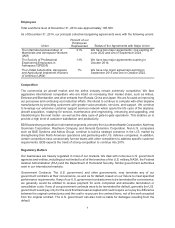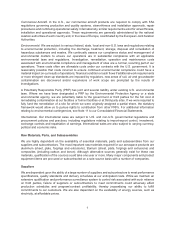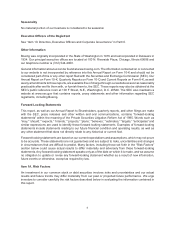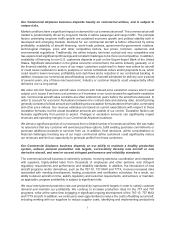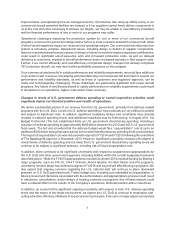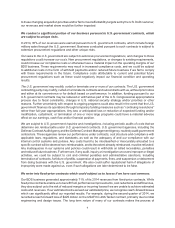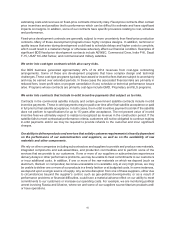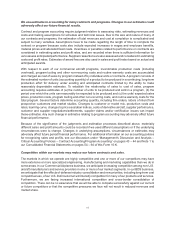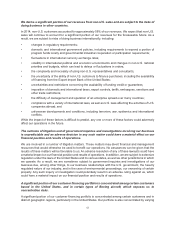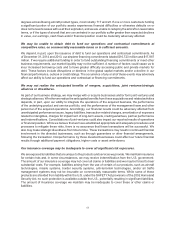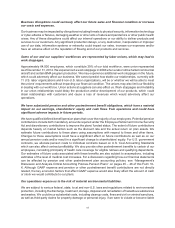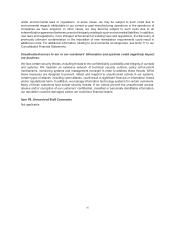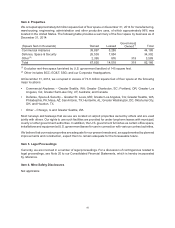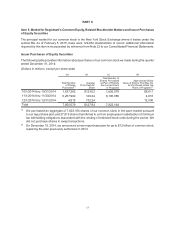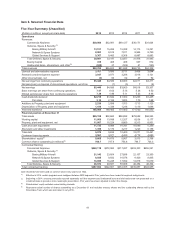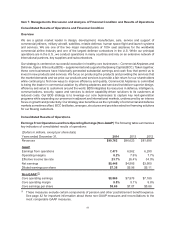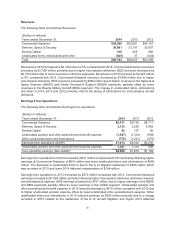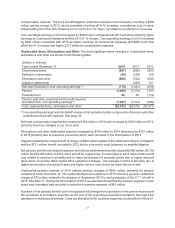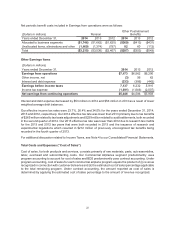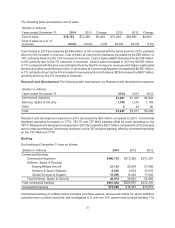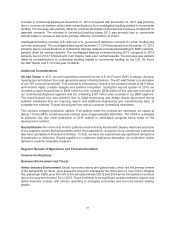Boeing 2014 Annual Report Download - page 26
Download and view the complete annual report
Please find page 26 of the 2014 Boeing annual report below. You can navigate through the pages in the report by either clicking on the pages listed below, or by using the keyword search tool below to find specific information within the annual report.14
Business disruptions could seriously affect our future sales and financial condition or increase
our costs and expenses.
Our business may be impacted by disruptions including threats to physical security, information technology
or cyber-attacks or failures, damaging weather or other acts of nature and pandemics or other public health
crises. Any of these disruptions could affect our internal operations or our ability to deliver products and
services to our customers. Any significant production delays, or any destruction, manipulation or improper
use of our data, information systems or networks could impact our sales, increase our expenses and/or
have an adverse effect on the reputation of Boeing and of our products and services.
Some of our and our suppliers’ workforces are represented by labor unions, which may lead to
work stoppages.
Approximately 64,000 employees, which constitute 39% of our total workforce, were union represented
as of December 31, 2014. We experienced a work stoppage in 2008 when a labor strike halted commercial
aircraft and certain BMA program production. We may experience additional work stoppages in the future,
which could adversely affect our business. We cannot predict how stable our relationships, currently with
11 U.S. labor organizations and 6 non-U.S. labor organizations, will be or whether we will be able to meet
the unions’ requirements without impacting our financial condition. The unions may also limit our flexibility
in dealing with our workforce. Union actions at suppliers can also affect us. Work stoppages and instability
in our union relationships could delay the production and/or development of our products, which could
strain relationships with customers and cause a loss of revenues which would adversely affect our
operations.
We have substantial pension and other postretirement benefit obligations, which have a material
impact on our earnings, shareholders' equity and cash flows from operations and could have
significant adverse impacts in future periods.
We have qualified defined benefit pension plans that cover the majority of our employees. Potential pension
contributions include both mandatory amounts required under the Employee Retirement Income Security
Act and discretionary contributions to improve the plans' funded status. The extent of future contributions
depends heavily on market factors such as the discount rate and the actual return on plan assets. We
estimate future contributions to these plans using assumptions with respect to these and other items.
Changes to those assumptions could have a significant effect on future contributions as well as on our
annual pension costs and/or result in a significant change to shareholders' equity. For U.S. government
contracts, we allocate pension costs to individual contracts based on U.S. Cost Accounting Standards
which can also affect contract profitability. We also provide other postretirement benefits to certain of our
employees, consisting principally of health care coverage for eligible retirees and qualifying dependents.
Our estimates of future costs associated with these benefits are also subject to assumptions, including
estimates of the level of medical cost increases. For a discussion regarding how our financial statements
can be affected by pension and other postretirement plan accounting policies, see “Management's
Discussion and Analysis-Critical Accounting Policies-Pension Plans” on pages 45 – 46 of this Form 10-
K. Although GAAP expense and pension or other postretirement benefit contributions are not directly
related, the key economic factors that affect GAAP expense would also likely affect the amount of cash
or stock we would contribute to our plans.
Our operations expose us to the risk of material environmental liabilities.
We are subject to various federal, state, local and non-U.S. laws and regulations related to environmental
protection, including the discharge, treatment, storage, disposal and remediation of hazardous substances
and wastes. We could incur substantial costs, including cleanup costs, fines and civil or criminal sanctions,
as well as third-party claims for property damage or personal injury, if we were to violate or become liable


